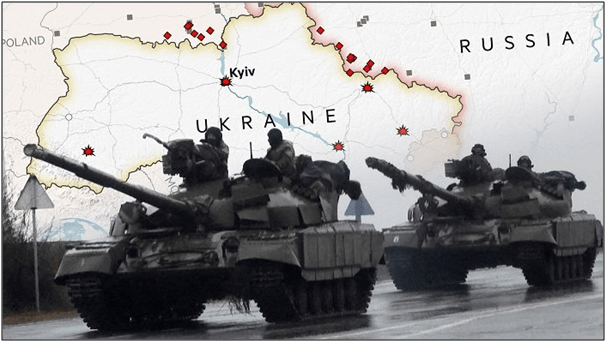It is critical that businesses today take serious consideration on the impact arises, directly or indirectly from the Russo-Ukrainian war, including any associated penalties as a result of trading with companies in Russia. Disruptions to the supply chain process are expected, especially for companies with Russian subsidiaries, operations, investments, contractual commitments, or joint ventures. Food and commodity shortages has been a threat globally even before the war started, largely due to COVID-19 pandemic. The Russo-Ukrainian war added stress and constraint to the situation worldwide. It is therefore essential for businesses to review and ensure supply chain resilience by leveraging on technology to stay competitive and relevant to today’s market development.

Table of Contents
Supply Chain Disruption
The Russian invasion of Ukraine in February 2022 may have been the final straw, but it was not the main culprit in the present global supply chain issue. Significant supply chain disruptions first surfaced during the trade disputes in 2018 and 2019, and they have continued to this day after being pushed into new areas by the COVID-19 pandemic. As the Russo-Ukrainian crisis worsens, supply chains that are still recovering from the COVID-19 pandemic must brace another round of seismic disruptions around the world. The fog of war will exacerbate recovery, affecting nearly all markets and businesses, either directly or indirectly. Even companies that do not have a direct supplier in the war region will be impacted by disruptions further down the supply chain. The significant increase in commodity prices has had a direct impact on the supply chain. Supply interruptions and delays from Russia, Ukraine and their neighbouring areas had worsened the situation. Supply chains will eventually face increased strain as a result of sanctions on Russia, such as the exclusion of its four largest banks from the Society for Worldwide Interbank Financial Telecommunication, or SWIFT. By doing this, the nation would have a tougher time concluding corporate deals and would have to execute simple transactions directly between banks or competitor systems, which would be more expensive and time-consuming.
Food Scarcity and Commodity Shortages
These repercussions include the potential for a global famine and the threat of a short supply of essential food resources like wheat. Meanwhile, disruptions in the supply of electronics, raw materials, and parts from China and other countries have severely hampered global trade positions, requiring businesses to evaluate and completely overhaul their long-standing supply chains and partner ecosystems.

Food shortage is a typical worry brought on by the Russo-Ukrainian conflict. It has a significant impact to global food supply, particularly severe for low-income nations in Africa. A third of the world’s production of wheat, a quarter of that of barley, and roughly three quarter of sunflower oil which form the essential commodities to feed people, are produced in Ukraine and Russia. Sanctions on Russia, the closure of Ukrainian ports, and the impossibility for Ukrainian farmers to work their fields are all contributing to a perfect storm that necessitates new forms of cooperation between businesses and governments in order to prevent a humanitarian crisis. Given Russia and Ukraine’s dominant positions in the markets, prices for food, gasoline, and fertilizer are surging, which raises the likelihood of global instability and unrest. Support for developed and poor nations dealing with this triangular crisis will be provided by the Global Crisis Response Group on Food, Energy, and Finance (GCRG). Global production of metals including nickel, copper, and iron is dominated by Russia and Ukraine. Huge quantities of raw materials including neon, palladium, and platinum are produced and exported.
The Need for Supply Chain Resilience
With the help of supply chain and procurement consultants, businesses can gain access to the most recent market information, a larger network of suppliers, information on how their competitors are addressing crises, and creative management strategies. When crucial components of the organization are produced or sourced from just one supplier or one location, there are significant risks involved.

An organization may eventually face problems with its materials or products as a result of supplier company closures, earthquakes, large-scale epidemics of infectious diseases, power outages, fires, etc. Projects will be delayed due to lack of or delay in the delivery of raw materials and completed items. This could lead to cost overrun, and the company may suffer loss of clients. Therefore, the procurement team must initiate necessary changes without undue delay in order to minimize the risk of disruption. This can be achieved by reducing dependency on specific nations, like China or Vietnam, look for alternate sources of supply, and create internal sourcing and delivery possibilities. Additionally, alternative sourcing guarantees optimal parts availability and helps to lower inventory costs.
The full content is only visible to SIPMM members
Already a member? Please Login to continue reading.

